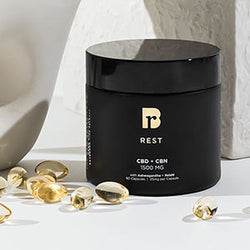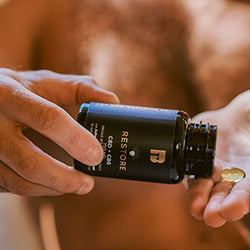Melatonin has become the go-to sleep supplement for millions of Americans struggling with occasional insomnia. While it's readily available and heavily marketed, many people are questioning: Is melatonin safe for regular use? And are there better options available?
Melatonin supplements work by mimicking the sleep hormone your body naturally produces in response to darkness. While generally considered safe for short-term use, concerns exist about its long-term effects. Some users have reported side effects like morning grogginess, headaches, and vivid dreams. More concerning are potential hormonal disruptions from regular use.
The truth is, melatonin isn't meant to be a nightly sleep aid. It's best suited for occasional use, like when adjusting to new time zones. If you’re seeking better sleep without the potential downsides, several effective melatonin alternatives deserve attention.
Why People Are Seeking Alternatives to Melatonin
As we age, our natural melatonin production decreases, which partly explains why many adults struggle with sleep. However, this doesn't necessarily mean supplementing with synthetic melatonin is the answer.
Regular melatonin use can potentially disrupt your body's natural production of this important hormone. Some users report developing a psychological dependency, worrying they can't sleep without it. Others find that melatonin loses effectiveness over time, requiring higher doses.
The growing interest in alternatives to melatonin for adults reflects a shift toward supporting the body's natural sleep processes rather than overriding them with synthetic hormones.
Natural Melatonin Alternatives That Work
There are definitely safe alternatives to melatonin that work with your body's systems rather than against them. By supporting your natural sleep architecture instead of forcing sleep, these options help you fall asleep naturally and wake feeling genuinely refreshed.
Adaptogens (Ashwagandha, Reishi)
Adaptogens like ashwagandha and reishi mushroom stand out among alternatives to melatonin for sleep because they help your body manage stress, often the root cause of sleep difficulties.
Ashwagandha has been shown to reduce cortisol (the stress hormone) levels, helping calm an overactive mind without sedation. Reishi mushroom promotes deeper relaxation and works with your body's natural sleep-wake cycle rather than disrupting it.
Magnesium
This essential mineral plays a key role in over 300 biochemical reactions in your body, including those that regulate sleep. Magnesium naturally relaxes muscles and calms the nervous system, making it easier to transition into sleep.
Many Americans are deficient in magnesium, which may contribute to sleep problems. Adding a high-quality magnesium supplement before bed can significantly improve sleep quality without the morning grogginess often associated with melatonin.
L-Theanine
Found naturally in green tea, L-theanine promotes a calm, alert state by increasing alpha brain waves. Unlike melatonin, it doesn't cause drowsiness but instead creates the mental conditions conducive to natural sleep.
L-theanine pairs particularly well with CBD and other natural sleep aids without melatonin, enhancing their relaxation benefits without adding side effects.
CBN + CBD
If you’re hoping for a truly powerful melatonin alternative, the combination of CBN (cannabinol) and CBD (cannabidiol) offers remarkable sleep-supporting benefits.
CBN has gained recognition for its sedative-like properties without causing intoxication. When combined with CBD, which reduces anxiety and promotes relaxation, the result is a gentle yet effective sleep aid that works with your body's own endocannabinoid system.
Unlike melatonin, these cannabinoids don't force sleep, but instead create optimal conditions for your natural sleep cycle to function properly.
What Is the Best Over-the-Counter Sleep Aid Without Melatonin?
When looking for the best non-melatonin sleep support, focus on products that combine several of the ingredients mentioned above. The most effective formulations typically include CBN and CBD for nervous system support, adaptogens like reishi and ashwagandha, and soothing herbs like Chamomile.
Our REST formulation combines precise ratios of these ingredients to support your body's natural sleep processes rather than overriding them.
How to Choose the Right Melatonin Alternative for You
Finding your ideal melatonin alternative starts with understanding what's keeping you awake. Is it stress? Physical discomfort? Racing thoughts?
For stress-related sleep issues, adaptogen-rich formulas with ashwagandha and reishi often work best. If physical tension is your main concern, products with magnesium and CBD might be more effective.
Consider your lifestyle as well. Frequent travelers might benefit from fast-acting tinctures, while those with chronic stress may prefer the consistent support of daily softgels.
Whatever you choose, consistency matters. Natural sleep supports often work subtly at first, with benefits building over time as your body's systems come back into balance.
WHICH PRODUCT IS RIGHT FOR ME?
The Raw Botanics Approach to Quality Sleep
Instead of relying on synthetic hormones or harsh sedatives, we combine hemp-derived cannabinoids with functional mushrooms and adaptogens to support your body's natural sleep architecture.
Our REST collection is designed to help you:
- Fall asleep naturally without feeling drugged
- Stay asleep through the night without disrupting sleep cycles
- Wake feeling genuinely refreshed
Customers who've made the switch from melatonin consistently report deeper, more restorative sleep and improved daytime energy. As one customer shared:
"This product is amazing! It's the only sleep aid to ever work for me, and I feel refreshed and energized in the morning. I especially appreciate that it doesn't knock me out but rather lets me drift off to sleep when I'm ready. Love it!”
When looking for safe alternatives to melatonin, the answer isn't finding another quick fix – it's supporting your body's natural processes with thoughtfully formulated, plant-based solutions that work with your physiology rather than overriding it. Your body knows how to sleep - sometimes it just needs the right support to remember.







